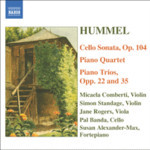
Hummel: Piano Trios / Piano Quartet in G major / Cello Sonata
 $25.00
Out of Stock
$25.00
Out of Stock6+ weeks add to cart
JOHANN NEPOMUK HUMMEL
Hummel: Piano Trios / Piano Quartet in G major / Cello Sonata
Susan Alexander-Max (fortepiano) / Pal Banda (cello) / Micaela Comberti (violin) / Jane Rogers (viola) / Simon Standage (violin)
[ Naxos / CD ]
Release Date: Friday 25 November 2005
This item is currently out of stock. It may take 6 or more weeks to obtain from when you place your order as this is a specialist product.
"Played with a fine sense of period style, and admirably recorded but for a slightly recessive piano behind closer strings, this is a charming addition to Hummel on disc."
Five Stars (Chamber choice of the Month) BBC Music Mag(Jan 2006)
"What sets this recording by The Music Collection apart from most, is the use of period instruments - and the pay-off is striking. Played with a fine sense of period style, and admirably recorded but for a slightly recessive piano behind closer strings, this is a charming addition to Hummel on disc."
Five Stars (Chamber choice of the Month) BBC Music Mag(Jan 2006)
"Wonderfully intimate period instrument performances of four of Hummel's charming chamber works. The Music Collection fully captures the poignancy of the mature Cello Sonata as well as the youthful exuberance of the remaining works"
(MusicWeb Recordings of the Year 2006)
Largely neglected by posterity, Johann Nepomuk Hummel in his own time enjoyed the highest reputation both as a composer and as a virtuoso performer. The increasing availability of his music, whether in print or in recordings, is evidence of the unjustified nature of the posthumous neglect of his work, although neither the bicentenary of his birth nor the 150th anniversary of his death in 1987 aroused the interest that his compositions clearly deserve.
Hummel was born in 1778 in Pressburg, the modern Slovak capital Bratislava, the son of a musician. At the age of four he could read music, at five play the violin and at six the piano. Two years later he became a pupil of Mozart in Vienna, lodging, as was the custom, in his master's house. On Mozart's suggestion the boy and his father embarked in 1788 on an extended concert tour. For four years they travelled through Germany and Denmark and by the spring of 1790 they were in Edinburgh, where they spent three months. There followed visits to Durham and to Cambridge before they arrived, in the autumn, in London. Plans in 1792 to tour France and Spain seemed inopportune at a time of revolution, so that father and son made their way back through Holland to Vienna.
The next ten years of Hummel's career found him occupied in study, in composition and in teaching in Vienna. When Beethoven had settled in Vienna in 1792, the year after Mozart's death, he had sought lessons from Haydn, from Albrechtsberger and from the Court Composer Antonio Salieri. Hummel was to study with the same teachers, the most distinguished Vienna had to offer. Albrechtsberger provided a sound technical basis for his composition, while Salieri gave instruction in writing for the voice and in the philosophy of aesthetics. Haydn, after his second visit to London, gave him some organ lessons, but warned him of the possible effect on his touch as a pianist. It was through Haydn that Hummel in 1804 became Konzertmeister to the second Prince Nikolaus Esterházy, effectively doing the work of Kapellmeister, a title that Haydn held nominally until his death in 1809. He had Haydn to thank, too, for his retention of his position with the Esterházy family when in 1808 neglect of his duties had brought dismissal. His connection with the family came to an end in 1811 but his period of service had given him experience as a composer of church and theatre music, while his father, as director of music at the Theater auf der Wieden and later of the famous Apollo Saal, provided other opportunities.
Hummel had impressed audiences as a child by his virtuosity as a pianist. He returned to the concert platform in 1814, at the time of the Congress of Vienna, a year after his marriage, but it was the Grand Duchy of Weimar, home of Goethe, that was able to provide him, in 1818, with a basis for his career. By the terms of his employment he was allowed leave of absence for three months each spring, a period spent in concert tours. In Protestant Weimar he was relieved of responsibilities for church music but presided at the opera and was, with Goethe, one of the tourist attractions of the place, although in speech his homely Viennese accent sorted ill with the speech of the resident literati.
In 1828 Hummel published his study of pianoforte performance technique, a work that enjoyed immediate success and has proved a valuable source for our knowledge of contemporary performance practice. Towards the end of his life his brilliance as a player diminished. This was the age of Liszt and a new school of virtuosity, while Hummel represented a continuation of the classical style of playing of his teacher, Mozart, now carried into the age of Chopin, Liszt, Kalkbrenner and Thalberg.
.
Tracks:
Piano Quartet in G major, Op. posth.
Piano Trio in G major, Op. 35
Cello Sonata in A major, Op. 104
Piano Trio in F major, Op. 22

